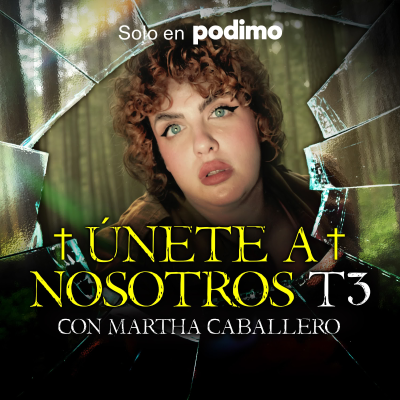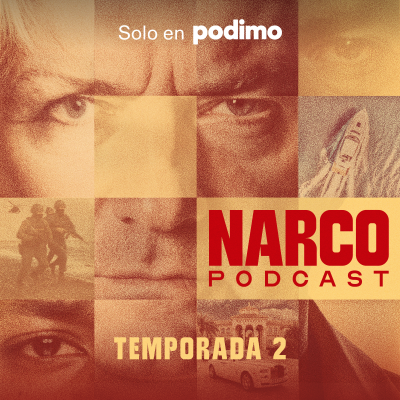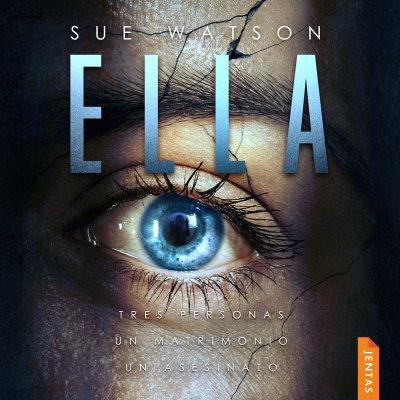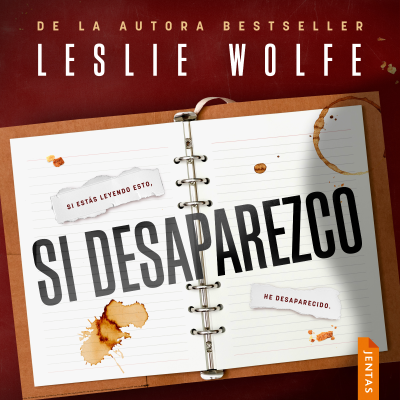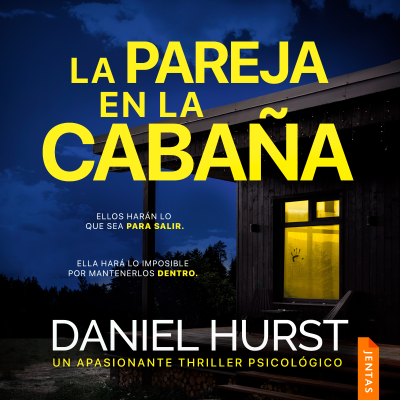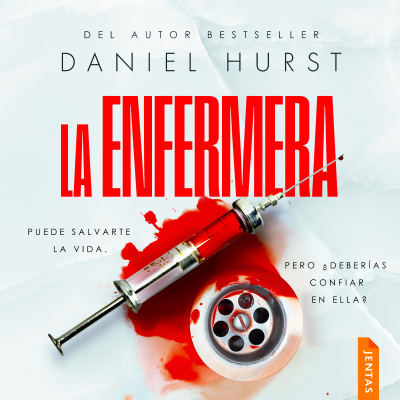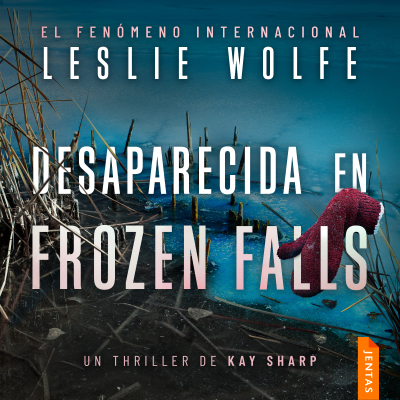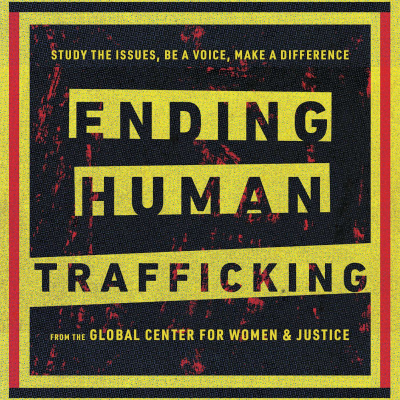
Ending Human Trafficking
inglés
Negocios
Oferta limitada
2 meses por 1 €
Después 4,99 € / mesCancela cuando quieras.
- 20 horas de audiolibros / mes
- Podcasts solo en Podimo
- Podcast gratuitos
Acerca de Ending Human Trafficking
The Global Center for Women and Justice launched the Ending Human Trafficking podcast in April 2011 and it has passed the 160 podcast milestone as of January 2018. Our mantra is Study the Issues. Be a voice. Make a difference. We believe that if you do not study first, you may say or do the wrong thing. The National Family and Youth Services Clearinghouse promoted EHT as “a good way to get up to speed on human trafficking”. Our audience includes students, community leaders, and even government leaders. EHT listeners come from all corners of the world, which accomplishes our mission of building a global community that works together to end human exploitation.
Todos los episodios
373 episodios366: Why Information Alone Will Never Protect Young People
Dr. Nanyamka Redmond joins guest host Ruthi Hanchett as they explore how everyday adults — parents, teachers, coaches, and neighbors — can become a powerful protective factor in young people's lives by building the kinds of relationships that help youth thrive and navigate risk. Chapters * (00:00) - * (00:00) - Introduction: Why Relationships Matter More Than Programs * (01:02) - Meet Dr. Nanyamka Redmond and the Search Institute * (02:48) - What Are Developmental Assets — and Why Do They Work? * (09:27) - Defining Developmental Relationships: The Five Elements * (14:57) - How Caring Adults Can Protect At-Risk Youth * (20:11) - Building a Culture of Belonging in Schools and Communities * (30:13) - Resilience Is Relational: What Adults Need to Hear Right Now * (32:35) - Supporting Youth Leadership Without Getting Out of the Way * (00:00) - Chapter 10 Dr. Nanyamka Redmond Dr. Nanyamka Redmond is a Research Scientist at the Search Institute, a nationally recognized organization dedicated to advancing research and practical frameworks that help young people thrive. She holds a PhD in Applied Developmental Psychology from Fuller Theological Seminary and a Master's Degree in Clinical Psychology, Marriage and Family Therapy from Azusa Pacific University. Her work focuses on developmental relationships, youth resilience, and advancing equitable, relationship-centered approaches to youth development and wellbeing. Dr. Redmond specializes in translating developmental science into practical tools for educators, families, youth-serving professionals, and community organizations, emphasizing culturally responsive and strengths-based approaches that center young people's lived experiences. She has also served as Director of School Partnership for Character Lab, co-founded by Angela Duckworth, and is a keynote speaker at the Global Center for Women and Justice's Ensure Justice Conference. Key Points * An anti-trafficking program can teach warning signs, but it cannot replace a caring adult — if a young person doesn't feel seen, safe, and valued, information alone won't protect them. * The Search Institute's 40 Developmental Assets framework identifies a combination of internal strengths and external supports that young people need to thrive, and research consistently shows that the more assets a young person has, the better their outcomes. * Developmental relationships go beyond good relationships — they are defined by five specific elements (express care, challenge growth, provide support, share power, and expand possibilities) that research has shown to directly impact positive youth outcomes and reduce risk. * For youth who have experienced trauma, relationships have often been transactional or harmful, so the experience of someone who cares without strings attached can be surprising — which is why consistency and small, repeated moments of connection matter more than grand gestures. * Belonging is not just a buzzword — when adults work to help every young person feel genuinely seen and valued in the spaces meant for them, it builds the sense of dignity that serves as a foundation for resilience. * Sharing power with young people doesn't mean abandoning guidance; it means entering those relationships with a frame that sees adolescence as an age of opportunity rather than a period of storm and stress. * Resilience is relational — it is not something young people build alone, but something that grows when multiple caring adults across their ecosystem show up consistently over time. * Adults who want to support youth leadership can start with incremental steps: invite young people to co-create the questions, let them lead the conversation, and hold the barriers gently without squashing the vision. Resources * Search Institute [https://searchinstitute.org] * The 40 Developmental Assets Framework [https://searchinstitute.org/developmental-assets] * Global Center for Women and Justice [https://www.gcwj.org] * Ending Human Trafficking Podcast [https://endinghumantrafficking.org] * Age of Opportunity: Lessons from the New Science of Adolescence by Laurence Steinberg [https://www.laurencesteinberg.com/books/age-of-opportunity]
365: What 25 Years of Sweden's Sex Purchase Act Revealed
Anna-Carin Svensson joins Dr. Sandie Morgan as they explore how Sweden's decision to punish buyers instead of victims has reshaped who feels safe coming forward — and how that same principle is now being applied to hold online exploitation accountable. Chapters * (00:00) - Introduction: Sweden's Principle That Changed Everything * (01:07) - The Equality Model: Why Sweden Criminalized Buyers, Not Sellers * (07:37) - What 25 Years of Data Actually Shows * (09:16) - When Exploitation Moves Online: Updating the Law for the Digital Age * (14:37) - Why Multidisciplinary Collaboration Is Non-Negotiable * (18:41) - The Gap Between Good Laws and Correct Application * (25:02) - Prevention Starts Before the Warning Signs * (29:51) - Hope, Humanity, and the Road Ahead Anna-Carin Svensson Anna-Carin Svensson serves as Sweden's Ambassador to Combat Trafficking in Persons, representing Sweden in multilateral anti-trafficking efforts including at the United Nations. In this role, she has participated in high-level discussions related to the appraisal of the UN Global Plan of Action to Combat Trafficking in Persons, including the side event "Proactive by Design: Leveraging Multidisciplinary Collaboration and Digital Innovation to Prevent Human Trafficking." Previously, Svensson served as Director-General for International Affairs at the Swedish Ministry of Justice, where she led Swedish delegations in international human rights forums and oversaw Sweden's implementation of international legal obligations, including under the Convention against Torture. Across her career, she has consistently emphasized state responsibility, institutional accountability, cross-government coordination, and the importance of translating legislation into effective practice. Key Points * Sweden's Sex Purchase Act, introduced in 1999, was a landmark legal shift that criminalized the buyer of sexual services rather than the seller, placing the state firmly on the side of the more vulnerable party in the transaction and signaling that prostitution is a harm to all of society — not just to the individual. * A 2010 official evaluation of the law found measurable results: street prostitution decreased, criminal networks were deterred from establishing trafficking operations in Sweden, and public attitudes shifted significantly — evidence that law can have both a direct and a normative effect. * As exploitation moved online, Sweden updated its legislation in 2025 to extend the same principle into the digital space, criminalizing the purchase of live, on-demand sexual acts performed remotely — because if something is illegal offline, it must be illegal online. * Many victims who had been coerced into performing live cam shows said the new law would have made it easier for them to refuse, illustrating how legal frameworks can shift power back to the exploited person even before a crime is prosecuted. * Correct application of the law matters as much as the law itself — broad training across all professions, not just specialized units, is essential so that any first responder can recognize a victim, give an appropriate initial response, and connect them to the right support. * Multidisciplinary collaboration is not optional: criminal justice, social services, civil society, health professionals, schools, and international partners must all work in concert, because victims often feel safer disclosing to a social worker or nonprofit than to law enforcement, and that trust must be honored. * Digital literacy and healthy relationship education must begin before exploitation happens — teaching young people to recognize manipulation, loverboy tactics, and online red flags is one of the most important prevention investments a society can make. * Hope lies in the growing global community of organizations and individuals bringing creative, collaborative solutions to every aspect of this problem — and in the simple recognition that for every challenge, there are many possible answers. Resources * Ending Human Trafficking Podcast [https://endinghumantrafficking.org] * Global Center for Women and Justice (GCWJ) [https://www.gcwj.org] * UN Global Plan of Action to Combat Trafficking in Persons – 2025 Appraisal [https://www.unodc.org/unodc/TIP_GPA_appraisal/index.html] * Sweden's Sex Purchase Act – Swedish Gender Equality Agency [https://swedishgenderequalityagency.se/men-s-violence-against-women/prostitution-and-human-trafficking/prostitution-policy-in-sweden-targeting-demand/] * Sweden's 2025 Online Sexual Acts Legislation – Library of Congress Summary [https://www.loc.gov/item/global-legal-monitor/2025-06-10/sweden-parliament-criminalizes-the-purchase-of-online-sexual-acts/] Transcript Click here to view the episode transcript. [https://share.transistor.fm/s/3939428a/transcript]
364: Are Our Systems Adapting as Fast as Traffickers Are?
Dr. Kari Johnstone joins Dr. Sandie Morgan as they discuss how traffickers adapt fast, moving money, victims, and exploitation through digital systems most of us interact with every day, examining whether our institutions are adapting fast enough to protect victims without them risking everything to testify. Dr. Kari Johnstone Dr. Kari Johnstone is the OSCE Special Representative and Co-ordinator for Combating Trafficking in Human Beings, representing the Organization for Security and Co-operation in Europe at the political level on human trafficking issues and coordinating anti-trafficking efforts across the OSCE region. Before joining the OSCE, Dr. Johnstone spent nearly a decade (2014-2023) as Senior Official, Acting Director, and Principal Deputy Director of the U.S. Department of State's Office to Monitor and Combat Trafficking in Persons (J/TIP), where she advised senior leadership on global trafficking policy and programming and oversaw the annual Trafficking in Persons Report. Her extensive U.S. government service also includes senior roles in the Bureau of Democracy, Human Rights, and Labor. Dr. Johnstone holds a B.A. from the University of Michigan and a Ph.D. in Political Science from the University of California, Berkeley. Key Points * The OSCE survey revealed a 17-fold increase in forced criminality cases over five years across the 57 member states, making it the fastest growing form of human trafficking globally. * Forced scamming, which originated in Southeast Asia, is now being exported to other regions as criminals adopt this lucrative business model that exploits victims with brutal tactics to defraud others. * Technology and artificial intelligence present both challenges and opportunities in combating trafficking, allowing law enforcement to process data more quickly to find victims and perpetrators while also being misused by traffickers for recruitment and exploitation. * Financial intelligence and following the money can supplement or even replace victim testimony in prosecutions, reducing the burden on survivors and providing effective pathways to convict traffickers. * The non-punishment principle remains woefully inadequate in practice worldwide, with victims often arrested, prosecuted, and convicted for crimes directly related to their trafficking experience, creating lifelong consequences that prevent access to housing, employment, and stability. * The United States leads globally on criminal record relief for trafficking survivors, with 48-49 states having vacature or expungement laws and new federal legislation (Trafficking Survivor Relief Act) awaiting presidential signature, though much work remains worldwide. * Victim assistance must be unlinked from the criminal justice process, allowing survivors to receive care and services first before deciding whether to cooperate with law enforcement, which actually increases the likelihood they will come forward and participate. * The demographics of trafficking victims are shifting beyond stereotypes, with forced scamming targeting educated individuals with IT and language skills, while forced criminality increasingly exploits younger children, including those under age 10, for drug-related crimes and violence. Resources * Organization for Security and Co-operation in Europe (OSCE) [https://www.osce.org] * OSCE Office of the Special Representative and Co-ordinator for Combating Trafficking in Human Beings [https://cthb.osce.org] * Protocol to Prevent, Suppress and Punish Trafficking in Persons (UN Palermo Protocol) [https://www.ohchr.org/en/instruments-mechanisms/instruments/protocol-prevent-suppress-and-punish-trafficking-persons] * UN Global Plan of Action to Combat Trafficking in Persons [https://www.unodc.org/unodc/en/human-trafficking/global-plan-of-action.html] * U.S. State Department Office to Monitor and Combat Trafficking in Persons [https://www.state.gov/bureaus-offices/under-secretary-for-foreign-assistance-humanitarian-affairs-and-religious-freedom/bureau-of-democracy-human-rights-and-labor/office-to-monitor-and-combat-trafficking-in-persons] * Trafficking in Persons Report [https://www.state.gov/trafficking-in-persons-report/] * Trafficking Survivors Relief Act [https://www.congress.gov/bill/118th-congress/senate-bill/4214] * Ending Human Trafficking Podcast [https://endinghumantrafficking.org]
363: The Hidden Link Between Romance Scams and Forced Labor
Matthew Friedman joins Dr. Sandie Morgan as they explore how pig butchering scams work, why they're so effective, and how they're tied to forced labor and human trafficking, while explaining what prevention can look like from personal red flags to safeguards in financial systems. Matthew Friedman Matthew Friedman is the Founder and CEO of The Mekong Club, a pioneering organization that mobilizes the private sector to fight modern slavery across Asia. A globally recognized expert on human trafficking, Friedman has spent over three decades working at the intersection of business, government, and humanitarian action to combat exploitation and promote ethical leadership. Before founding The Mekong Club, Friedman served as Regional Project Manager for the United Nations International Project on Human Trafficking (UNIAP/UNDP), overseeing a six-country initiative spanning China, Cambodia, Laos, Myanmar, Vietnam, and Thailand. He also served as Deputy Director for the USAID Office of Public Health (Asia Region), managing a $100 million annual portfolio. Friedman holds a Master's degree in Health Education from New York University and is a renowned keynote speaker who has delivered more than 900 presentations in 20 countries, inspiring individuals and organizations to take a stand in the fight against modern slavery. Key Points * Pig butchering scams are sophisticated romance scams where criminals build trust over weeks before convincing victims to invest life savings in fake cryptocurrency schemes, with the metaphor referring to "fattening the pig before the slaughter." * An estimated 300,000 to 400,000 young professionals have been trafficked into scam centers across Southeast Asia, where they are forced under extreme violence and coercion to run online scams targeting victims in wealthy nations. * The Prince Group sanctions marked one of the most significant global crackdowns on forced-labor scam centers, with the UK freezing real estate assets and the US freezing $15 billion in cryptocurrency, signaling increased international cooperation. * Financial institutions can help prevent pig butchering by monitoring unusual withdrawal patterns, such as when customers who haven't touched their accounts for 30 years suddenly liquidate everything, and by contacting clients before large transfers are completed. * Victims in scam centers face brutal violence including being tasered, beaten, and in some cases tortured to death with videos sold as "hardcore" content, creating a level of violence unprecedented in modern slavery according to Friedman's 35 years of experience. * Only 0.2% of the 50 million people in modern slavery receive assistance globally, not because counter-trafficking organizations don't care, but because the $236 billion generated by criminals vastly outweighs the $400 million available to fight it. * Public education and awareness are critical for prevention, as people in North America remain largely unaware of pig butchering scams while Asian communities have become more informed through widespread media coverage and victim testimonies. * The Mekong Club has developed multilingual e-learning tools including a three-and-a-half-minute video to help raise awareness about both human trafficking into scam centers and the scams themselves, emphasizing that prevention must be widespread. Resources * The Mekong Club [https://themekongclub.org] * The Mekong Club - Tools & Resources [https://themekongclub.org/tool-resources] * Valid8 Financial [https://www.valid8financial.com] * Ending Human Trafficking Podcast - Episode 269 [https://endinghumantrafficking.org/269/] * Matthew Friedman on LinkedIn [https://www.linkedin.com/in/matthew-friedman-9788555] * Contact Matthew Friedman [matt.friedman@themekongclub.org] * Ending Human Trafficking Website [https://endinghumantrafficking.org]
362 – Before Teens Hide Online, Youth Pastors Must Build Trust
Brenton Fessler joins Dr. Sandie Morgan as they explore why teenagers aren’t hiding their digital lives because they’re rebellious—they’re hiding because they don’t feel safe talking, and what trusted adults do next can change everything. BRENTON FESSLER Brenton Fessler is the Lead Pastor of Refuge OC Church in Orange County, California, where he provides vision and leadership for a growing faith community with a strong emphasis on family, discipleship, and community responsibility. With a background in youth ministry and ministry education, Brenton brings deep experience working with adolescents, parents, and church leaders navigating the complexities of formation, trust, and safety in a digital age. In addition to his pastoral leadership, Brenton has taught ministry-related courses and mentored emerging youth pastors, equipping them to build relationally healthy, developmentally appropriate, and ethically grounded ministry environments. As a parent of teenagers himself, he offers a practical, lived perspective on the challenges families face around technology, online identity formation, and risk exposure. Brenton’s work reflects a prevention-first, relational approach rooted in grace, accountability, and collaboration between parents, churches, and broader community systems. KEY POINTS * Youth pastors hold a unique position of trust with teenagers, making them critical partners in digital safety conversations, as students often confide in them before approaching parents about risky online behavior. * The scaffolding metaphor illustrates healthy digital boundaries—parents and church leaders provide temporary support structures that can be removed as young people demonstrate increasing responsibility, rather than permanent fences. * When a 14-year-old discloses risky online behavior, youth pastors should offer to walk alongside them in conversations with parents rather than protecting confidentiality at all costs, because these young people need adult guidance to navigate complex situations safely. * Youth ministry should focus on spiritual formation and relationship building rather than behavior modification, creating environments where students feel safe to make mistakes and receive grace while learning to live righteously. * Churches need to update child protection policies to include digital and virtual environments with the same rigor as physical spaces, including background checks that examine volunteers’ online presence and social media activity. * Youth pastors serve as cultural missionaries within church staffs, helping senior pastors understand emerging technologies, social media platforms, and the realities of youth culture that shape the next generation’s spiritual development. * The “talk tech every day” initiative from Ensure Justice emphasizes that digital safety conversations must be ongoing and integrated into daily family life, not reactive responses to scary news articles. * Building cross-generational trust requires two-way mentoring where students teach adults about technology while adults provide wisdom and boundaries, creating healthy churches where both generations learn from each other. RESOURCES * Influence Magazine Winter 2025 Issue [https://influencemagazine.com/Practice/Winter-2025-Issue-Online] * Episode 354: Love Bombs and Long Cons: Understanding Pig Butchering Scams [https://endinghumantrafficking.org/354-love-bombs-and-long-cons-understanding-pig-butchering-scams/] * Ensure Justice Conference [https://www.gcwj.org/ensurejustice] * Royal Family Kids Camp [https://www.forthechildren.org/about-us/camps] * Refuge OC Church [https://www.refugeoc.com/] TRANSCRIPT [00:00:00] Brenton Fessler: The youth pastor decided that the best way forward was to actually call her up on stage and have her publicly announce her pregnancy so he could shame her as if behavior modification was gonna be the true path to her healing. [00:00:15] But [00:00:15] Delaney: Teenagers aren’t hiding their digital lives because they’re rebellious. They’re hiding because they don’t feel safe talking. What trusted adults do next can change everything. In this episode, you’ll hear why talk tech every day matters. How to set guardrails without shame and what to do when a teen says, I can’t tell my parents. [00:00:35] Hi, I’m Delaney. I’m a student here at Vanguard University and I help produce this show. Today, Sandie Talks with Dr. Brenton Fessler. He’s the lead pastor of Refuge OC in Orange County with years of youth ministry experience and mentoring youth leaders focused on digital safety and trust building with teens. [00:00:54] Now here’s their conversation. [00:00:57] [00:01:03] Sandie Morgan: Reverend Dr. Brenton Fessler, welcome to the Ending Human Trafficking Podcast. [00:01:10] Brenton Fessler: Thank you, Sandie. It is so good to be with you and I’m delighted. I hope I can add to the conversation, but I’m really honored to be here. [00:01:18] Sandie Morgan: This isn’t the way I usually do this, Brenton. But you read the article that they published in Influence Magazine under the youth pastor column, and the concern is digital safety for our kids. [00:01:35] So when you read that, did you have a question? Wow. If I could talk to Dr. Sandie Morgan. This is what I’d ask her. [00:01:45] Brenton Fessler: Ooh, that’s a good point. No, I was captivated by the research right off the bat, mainly because in addition to being a pastor that obviously oversees a youth team that interacts with students in junior high and high school. I’ve got three teenagers in my house. One is about to turn 20 in just a few months. [00:02:02] But I care about this issue deeply because my wife, Rachel, and I are always thinking about where are they being exposed? And you said, so I just highlighted a few things from the article about how they’re forming their identity in this online atmosphere in ways that parents don’t fully understand or grasp the impact of that. [00:02:23] And I was blown away. [00:02:25] Sandie Morgan: It’s difficult for parents to really, truly comprehend because we’re not living in that context and we’re all in the same house. Yet our challenges are very different. So, and for listeners, I’m gonna put a link to the article in the winter issue of Influence Magazine. So you’ll be able to read this and maybe it’ll raise some questions and. [00:02:57] I would recommend is you don’t necessarily ask me because this is a foreign language for me as well. but talk to your teenagers. We’ve got to have daily, a couple years ago at Ensure Justice, what everybody was saying by the end of Saturday is talk tech. Every day. Not once a week, not when somebody reads a scary article, but talk tech every day. [00:03:29] Kids, you need to make sure your parents understand. You need to make sure your grandparents, wow, Brenton. If you wanna be concerned, go back and listen to the podcast I did about pig butchering, which is how AI is being used to fraudulently steal from your grandmother [00:03:56] and so grandkids you can have a trade-off day where grandkids, teach grandparents how to be safe online. [00:04:06] Brenton Fessler: Right. Oh, so true. So true. It’s a scary world. And even as a parent, I think about the moments where we first dropped our kids off at school when they were in preschool, and we trusted them to this world that we no longer controlled. And it’s the same way, even as teenagers, we give them these devices and in a lot of ways, they have to have them to actually exist or function in the worlds that they are in. [00:04:33] COVID obviously took everything online and education continues to be online, but their development, like you say in the article, is an online experiment. And so if I’m not participating in their social development or giving them boundary markers, if you will, and I loved even the language that you had in the article. [00:04:52] But I was guided by a mentor father figure in my life who just said, Hey, you’re giving guardrails to your kids. Make sure that you give them room. they’re gonna make mistakes, but make sure they don’t make the mistakes that are beyond the scope of repair. And like, that’s it. [00:05:08] Sandie Morgan: That is such a good point and one of the things I think about with those guardrails, it’s like when you teach a kid to walk, they fall a lot, but they’re really close to the ground so they don’t break anything. But when you don’t give kids a chance to test things in a safe space, then when they fall, it’s disaster. [00:05:36] Brenton Fessler: Yeah. Yeah. [00:05:37] Sandie Morgan: Ernie Allen came to speak here at Vanguard several years ago, and he used an illustration that has been a guiding force for me in this conversation, he told, and he’s even more senior than I am, but he’s been a mentor and I really look up to him. So he talked about when he was an attorney general. [00:06:06] Looking at the history as new technology introduced new things, and he went back to when cars first came on the scene. And so the cops complained because the crooks could afford these fancy cars and the horses couldn’t catch them. So guess what they wanted to do? [00:06:31] Hmm. They wanted to outlaw cars. [00:06:35] Brenton Fessler: Oh, interesting. Yeah. New, Yeah, exactly. [00:06:40] Sandie Morgan: So we wouldn’t even think that we, we would laugh and chuckle at that now, but the idea that now we don’t chase crooks with horses, although we do have some mounted police in some areas, that’s for sure. [00:06:57] Brenton Fessler: right. [00:06:58] Sandie Morgan: So, so we’re talking about guardrails, we’re talking about two-way mentoring because we have things to learn from our kids. [00:07:10] In the article, I really stressed the relational environment that youth pastors have with students, so they feel comfortable talking about what’s going on online. And so what kind of advice? You’ve been a youth pastor. You’ve taught ministry classes for youth pastors here at Vanguard. You’re a senior pastor and you keep an eye. [00:07:39] On what’s going on in your youth department? What are some practical steps that can build the kind of trust that encourages teens to speak honestly about their digital lives because they do hide. [00:07:56] Brenton Fessler: they definitely do. But the importance of even putting your kids and your teenagers in environments where they have other adults speaking into their life is so key and important. Obviously, we understand they do that when they go to school. They’ve got teachers or they’ve got coaches on their sports teams, but the element of having a religious person in their life, a youth pastor, a youth leader, a small group leader who will pour into them. I remember being given such freedom with students who trusted me even more than their parents in that season of their life. And I find myself now as a parent of those teenagers, but also as a pastor, overseeing a group of leaders who oversee students is their influence is monumental. [00:08:40] And so not taking that for granted, but having intentional conversations with students about what are you putting out online? What kind of curation are you doing in your lives to where it either will hurt you in the long term or adversely affect you in the long term. And so will you trust the youth leaders in your life to speak into that? [00:09:01] Will they challenge you? And so, I say to our youth staff, have those, build those lanes of trust with those students so that they’re gonna go to you and ask the questions. ’cause they won’t go to their parents. I know that. I didn’t go to my parents all the time. I don’t know if that was your story, Sandie, but I remember where I want other adults to weigh in on my life. [00:09:20] ’cause I can’t wait to grow up. And the people that I’m gonna follow are the people who are closer to me in age than my parents are. And so are those youth leaders and youth staff living righteously themselves, but also are they providing space for students to consider how their lives are lived online? [00:09:39] And I think it’s super important. [00:09:41] Sandie Morgan: That’s one of the key principles with our peer educators going out into the schools to do prevention is that the young people will trust one that is closer to their age. So you build that trust and then that’s a lot of power that you hold in your hand. So Brenton. A 14-year-old girl comes to you, you are the youth pastor, and the, she starts with, I can’t talk to my parents about this. [00:10:20] And there is a great deal of shame already in the tone of her words. And she sent a picture or she got involved in a conversation that’s pretty risky online behavior. And so what I’ve heard youth pastors say to me is. I didn’t talk to her parents. I wanted to protect her confidentiality and her trust of me. [00:10:55] How do you manage the trust of the parents along with the fact that this is a 14-year-old whose brain is not finished developing, and they need assistance in those high risk conversations to navigate and stay safe? [00:11:16] Brenton Fessler: Yeah, and I think that’s super important because it is a make or break moment for that youth leader and that youth pastor, because you’re given trust by the student, but you don’t want to abdicate your role as well as helping them understand that you actually get to be a go-between, between them and the parents, and obviously you’re helping them see that their parents aren’t the enemy, their parents aren’t gonna be a negative factor in their life. [00:11:40] Obviously you have to discern a little bit, is it an unhealthy home environment? That would be a case for another conversation, but as long as there is a semblance of health and structure in that family, I would say to those youth pastors and those youth leaders is that I would offer to that student. [00:11:56] I wanna strategize with you about a conversation with your parents on this issue. I want to help you navigate that. Can I go with you? Can I help you in sharing the news with them? I mean, I remember a vastly different topic, but I remember when a student that I was in our youth group found out she was pregnant and she wanted my wife and I to go with her to tell her parents because she was scared of their response. [00:12:22] And if I can help soften the blow in that moment, I’ll do that. But the same thing would be true if she is caught in this moment of I’ve done something online, or I’ve shared that picture, and something is being done to me online by someone else using this opportunity as a youth pastor, youth leader, to say It’s okay to go talk with the parents and let me help you navigate through this. [00:12:42] Because your parents want to make sure that you’re not doing something that’s gonna have long lasting adverse effects on your life and your psyche and your mind as it continues to develop. [00:12:53] Sandie Morgan: Wow. I love that. Walking alongside through a difficult conversation. How does a youth pastor maintain a judgment-free atmosphere by still providing clear, biblical and behavioral boundaries? [00:13:16] Brenton Fessler: Yeah, and I would say a lot of that depends on the type of environment that the church functions in. I mean, Sandie, I’m gonna tell you a pretty drastic story that affected my adolescence. I was in high school youth group and there was a, this time period in my life, I’m a teenager. [00:13:34] There’s a girl in our youth group who found out she was pregnant and the youth pastor decided that the best way forward was to actually call her up on stage and have her publicly announce her pregnancy so he could shame her as if behavior modification was gonna be the true path to her healing. [00:13:53] But we all know, like all the students in the group knew who she had the relationship with, but who wasn’t called on stage was the guy. And so I think sometimes it’s the environment that the pastor or the youth pastor is in to where, what is your church’s philosophy on understanding that youth ministry is not behavior modification? [00:14:10] Youth ministry is trying their best to make sure that a student has an opportunity to experience Jesus, but also begin that journey of living righteously and they’re gonna make mistakes. I mean, the Bible is full of people with all kinds of red marks on their record, and it’s not beyond the scope and the hope that Jesus continuing to use them, but a youth pastor has to determine I’m not here to fix their bad behaviors. [00:14:38] I’m here to see them continue to mature and grow and be discipled towards a better follower of Jesus. But I would say it’s gotta begin with that because some youth pastors I know just want to fix behavior and so they’ll rail on sin as if that one sermon can get it done if you come forward and confess everything’s good, which that doesn’t create an environment where a student feels safe or heard. [00:15:01] With that youth pastor or that church. And so sometimes students will go to other youth pastors in churches to find acceptance. But again, I think what you said is really key. It’s not, it’s a judgment free zone, but it doesn’t mean that we abdicate our rooted foundation in scripture and obviously our understanding of what does it mean to be a healthy follower of Jesus. [00:15:22] But it’s, there’s so much more to that. And so I would say I implore my other fellow sisters and brothers who are lead pastors of churches that you gotta create an environment where youth pastors have freedom to make sure that students feel safe in their presence, but ultimately that they’re including you at times when needed Other help when necessary, if it’s a licensed therapist or counselor. But when it comes to these issues that you even bring up in the article, in the Influence magazine is this is where students are living. They live their life online and they don’t even know, we don’t give them keys to a car until they pass a test. [00:15:59] Maybe after 16. Why are we just giving them keys to a worldwide web that sometimes could really drastically alter everything about them. [00:16:09] Sandie Morgan: Wow. Okay. Now let’s talk about that discipleship process. And to your point earlier about guardrails, I use the metaphor of scaffolding, and I like the idea I’m not building a fence around you to keep you out of. I am building the scaffolding so that once something is solidly finished, a project, a building, a wall, a roof, I can take the [00:16:48] scaffolding down. [00:16:49] So I think young people need to understand it’s temporary. It’s not forever, and they want to take advantage and see that as a benefit in their lives because as they practice increasing responsibility, then they actually get those keys. [00:17:13] Brenton Fessler: Yeah. Yeah. And the scaffolding is a metaphor I love. And I would say even one that’s closely aligned with it would be. You remember going to bowling alleys if your spiritual development ever allowed you to do that. Sandie, bowling alleys, especially for young kids, put those bumpers in the gutters. [00:17:34] And so the ball will never actually make it in the gutter. It will always make it down the path. And I think that is the season that we find ourselves in with students that there are parents and churches and youth pastors and youth leaders that need to be the gutters or the bumpers in the gutters or the scaffolding that will surround them to help their growth and their development, because that’s the image that we’re working with. [00:17:56] We want these individuals to grow up to be healthy, full flung functioning adults. And not just adults for society, but adults for the kingdom, that their heart continues to burn with passion for what Jesus is doing, that we see injustice in the world and we want to see it fixed and restored and the brokenness to be whole again. [00:18:14] That is the whole concept of following Jesus in his kingdom, to bring restoration to a broken world. And so we want them to live fully into that, but they need to know that sometimes mistakes can be fixed. And there are moments that you are gonna need someone who’s a little older, a little wiser at times, or has been down the road a little bit or around the block, if you will, and can help them navigate that successfully. [00:18:40] And so I think a youth pastor or a church leader, a pastor needs to make sure that she or he is one that’s ready and willing to be that scaffolding and to remove it when it’s time. Not to keep a person stuck in the scaffolding phase of life, but remove it when the growth has been seen or been developed. [00:19:00] And it’s so needed, especially in the area of how do you navigate the online space because it’s a scary world. I mean, again, I live with teenagers in my house. We put a lot of lockdown. You know, I’ve got a 19-year-old in college. I have a 17-year-old junior in high school and a 15-year-old freshman, and I have girl, boy, girl. [00:19:19] And the rules applied to each of them individually, that we put screen time protections on their phone. And it wasn’t because we just wanted to have so much control. It just, I wanna help you navigate this place. And as you got older and as we had conversation with you, you got a little bit more freedom. [00:19:35] And so your interactions with your friends happened online. But my 15-year-old daughter who’s a freshman in high school, she still does not have social media. Because we just knew from the get go that social media opens you up to another world of engagement with people sometimes that you don’t know and don’t trust. [00:19:50] And why would I put my daughter in a city of strangers? And that’s what I do online and I’ve gotta be careful of that. [00:19:59] Sandie Morgan: Wow. So how do you transfer that? Because obviously you are still you, Brenton, Fessler. Whether you’re dad or pastor, but you are mentoring a youth pastor, a youth leader, how do you give them examples in real life, ministry practice on how they can coach a digital decision that one of their kids is making? [00:20:31] Brenton Fessler: Yeah, our youth team at our church in the city of Orange is made up of people in their twenties. And so I’ve got a lot of growing to do for them. But much like I was given opportunities to grow and develop as a youth pastor, I wanna give them stories, but I also want to trust them because what I have noticed by our youth team at our church is the students who attend our youth group gatherings, they [00:20:57] Wholeheartedly love our youth pastors. It’s a husband and wife team, and they’ve developed a group of other adult leaders to be a part of the mix. And I love that my kids don’t want to miss a night and want to be there and other students feel it. And my kids don’t just go because they’re the pastor’s kids. [00:21:12] Other families send their students to these group gatherings. And now we’re getting students who, parents don’t even attend our church, but they’re attending our youth programs. And so I’m trying to tell them, and instill in them, you are given a lot of trust with these parents, but you’re also ultimately getting a lot of trust from these students. [00:21:29] You don’t wanna squander it, and so you don’t want to hear about their behavior and shame them. You don’t want to hear about something that they may have done, but guide them through this process. Much like even we watched the discipleship process happen with Jesus and his followers, right? He gives them a lot of space, a lot of moments to make mistakes. [00:21:47] Peter wasn’t perfect, nor were the others, right? And so can you live in an environment and the church and in a youth group setting where perfection isn’t necessarily the daily goal? Because if you’re gonna live like that, that’s a letter of the law living and it’s gonna be laborious and fatiguing and no one wins in that environment. [00:22:06] And why is it that Jesus says, I’m gonna come here and fulfill this, but not from a place of I can’t wait to find you making a mistake. But it’s from a place of grace is always on the table. Now there are decisions that are made at times by a student that there are gonna be natural consequences, but we help guide them through that and say, Hey, it’s not the end of the world. [00:22:26] And so for my student leadership team, I wanna pour into them and give them examples, not just from my past, but also my experience as a parent, I wanna say to them, Hey. I get to be almost like the lab rat where you get to test a lot on because my kids are in, like, we love what’s happening here. [00:22:45] So if you’ve got questions, what does a parent think? What does a parent do? Ask me. But I also wanna give you my wisdom from my previous life as a youth pastor. Like, here’s where I made mistakes, here’s where I did not steward well the trust that was given to me by parents and youth. And so the mistakes I’ve done, I wanna make sure that they can build upon them and do better than me. [00:23:09] And so I want to provide an atmosphere where it’s laboratory, if you will, to where we’re always practicing and continuing to refine how we pastor our community. [00:23:20] Sandie Morgan: So this relationship between parents and youth pastors and senior pastors, it can be a little complicated. Are there suggestions you have for youth pastors whose senior pastor isn’t involved, doesn’t have teenagers, maybe has grandchildren, so they’re not gonna be experiencing any of this like you are. [00:23:49] How does a youth pastor let the senior pastor know they need more guidance on this? [00:23:57] Brenton Fessler: Yeah, and I would say a youth pastor’s gift to any church team is that you really do get to have a pulse on the next generation and the culture that’s developing, and so almost see yourself as a cultural missionary for your church staff. I mean, every youth pastor in America became the hero during COVID because most senior pastors that were older than 50 [00:24:21] Didn’t even know how to do online services, let alone know how to take the offering online. And so youth pastors became heroes because they knew how to operate the online space in various ways, whether it’s a website development or even social media. And so youth pastors, you have an opportunity to prove your worth to your church team. [00:24:39] You get to be that cultural savant for your pastor and say, could you lean into regular interactions and meetings? Or maybe would it be just like at, what would it look like to give monthly reports to your church staff? Hey, here’s what’s new in youth culture. Hey, let me catch you up on this new thing. [00:25:00] Here are the top five people that are singing out there in music culture, but also in video culture or movie culture. Here are the things that students are talking about, just so you’re aware. It’s almost, almost take on that role as that person who, like I said, is the cultural missionary. [00:25:18] Here’s what’s happening in this culture where you earn the respect of that older leadership. And I would say you gotta constantly put yourself out there and ask for those meetings to be had. And obviously if a senior pastor is completely uninterested in that environment of interacting with their youth pastor. [00:25:35] Perhaps a change should happen on either side, whether it’s a youth pastor finding a new home, or maybe the senior pastor needs to find a new home. And I will say to every senior pastor that’s listening to this podcast is, care about your youth pastors, lean into them. Have more coffee or boba interactions because that’s where 20 and 30 somethings are hanging out at. [00:25:55] Interact with your youth pastor team and pour into them. And most churches in America have volunteer youth pastor teams, so don’t take advantage of them as just free help. Use them to be this as a bridge between you as a senior pastor and the next generation that’s coming up because we don’t wanna lose the hearts of the students in junior high and high school because they really are the future. [00:26:20] That’s not just scripture talk. Like it’s why young people continue to matter to the kingdom is because they have an opportunity to lead with passion for what’s ahead. And we’ve gotta steward that well. [00:26:32] Sandie Morgan: I’m like wishing I’d have written something like that in the article, but this idea that when I’m hanging out with youth pastors and I was at an event recently where there were a bunch of them. I almost felt like they were making fun of me when they talked about certain things and I didn’t feel like [00:26:59] I could ask them for help. I come back to Vanguard and I’m with my students and they’re like, showing me, here, give me your phone. I’m gonna show you how to do this. And they teach me things and I think if we want to promote intergenerational healthy churches, then building that cross generation trust, respect, and it’s a two-way street. [00:27:25] It’s not just one way. So your advice is really valuable. I wanna talk about one more thing about how do you build child protection policies now that include digital, virtual environments? Where’s that? [00:27:47] Brenton Fessler: Yeah, and we’re still in that learning phase as a church. We’re 10 years old, so we’re still in some ways new kids on the block. We’re not the church that planted last year. We’ve got a few years under our belt, but we’re still learning with everybody else, and we exist, at least our church exists in the climate of California, which already is a hyper litigious [00:28:07] State where we’ve got so many extra parameters of understanding for any nonprofit or church work. And so we’ve got extra qualifications that almost have to go into place. But I would say we need to make sure that that’s also a part of the regular conversation piece with any of our adult leaders that are part of ministry teams. [00:28:27] We want to see what you’re doing online, and not to say that we get to have access or password control to your life, but what you represent online also reflects on some of your ministry involvement. And so that’s another piece that I would say to, if there’s a teenager listening, it actually does matter what you post today. [00:28:49] It will sometime come out in the future, but also to my other brothers and sisters in church context, whether you’re a lead pastor or a youth pastor, or a staff pastor, care about the environment that your volunteer leaders have online. What did they say online? What did they represent? What did they stand for? [00:29:07] Sandie, I’ll give you an example. In the city that I’m a pastor in, a couple years ago, I got invited to go through the background check process to become a volunteer police chaplain. So for Orange Police department. I’m one of their volunteer police chaplains. The background check process went about six months. [00:29:24] They interviewed my neighbors, they interviewed my family members. They wanted every social media handle that I have, and they went after me or they just went through to see what kind of a person am I, will I represent, even though I’m a pastor in the community that no longer has a free entrance card to we’ll trust everything about you. [00:29:49] And so they wanted to see what is it that, what’s my life online like? And I was actually really taken aback by that. I’m like, this is what we need to do as a church. So if we’re gonna interview, no longer is it a background check, or a fingerprint, or a live scan for a volunteer, I wanna begin to see evidence of a healthy life online and doesn’t mean that you’re beyond the scope of forgiveness or making fixes to a past that maybe you’re not all that proud of. And we all have our come to Jesus moments in our life. But that should also include moments online. So, where am I at currently? Do I represent Jesus well online? [00:30:32] Do I represent a life that is worthy of kingdom work in a local church context? And so I think we’re beginning to develop even talking with you right now, that as we anticipate the next year, the new people that we add to our volunteer team working with kids and youth, and we run Royal Family Kids camp. [00:30:51] So we’re working with foster kids that have often been abused. And so for one week, each summer we have an opportunity to train leaders that we wanna see if we’re gonna train you to be a part of this context. We care about even how you live online. [00:31:06] Sandie Morgan: Wow. Well, I was at the UN last week and had a wonderful conversation with the human trafficking ambassador from Sweden, and she was excited to tell me they just passed a law. And this is my humble summary. It’s not legalese, but they just passed a law so that anything you do to a child in person and you do it and it’s illegal and you do it online is the same crime, the same life sentence, [00:31:49] Brenton Fessler: yeah. That makes a lot of sense. Yeah. [00:31:51] Sandie Morgan: So you can’t go online and literally extort a teenager or pay for a child sexual abuse image to be made or a live stream, you will actually go to prison just like as if you’d done it in person. So I’m thinking we have to use that, it sounds extreme logic for revising our child protection policies. [00:32:26] If we require two teachers to be in a room, then if we’re doing something online, we can’t be alone with a child. And it’s gonna take a while for us to get caught up with the invention of cars if we’re still riding horses, right? [00:32:48] Brenton Fessler: Right, right. And I think that is a role that church should play happily. That we, we care about that too many stories of church or church environments where people have been abused in really drastic fashion, and some are coming to light even recently that it pains me to say, but we need to care about young people, anybody under 18 is a minor of any form. We need to care about the ways that they are interacting with people that represent Jesus. And so much abuse has happened by people who have called themselves Christians and we need to do a better job. Yeah. [00:33:24] Sandie Morgan: I totally agree and I look forward to more conversations about this. I believe youth pastors have been hesitant to be the ones to raise some of these questions, but I think it’s definitely a valuable conversation. I appreciate your insight as a lead pastor as well as a parent, and I hope to have more conversations like this. [00:33:51] Thank you so much. [00:33:53] Brenton Fessler: Thank you Sandie. This was a joy to me as well and I appreciate the invite. [00:33:57] Delaney: Thanks to Reverend Dr. Brenton Fessler for sharing a hard but necessary point. Safeguarding can’t stop at the church doors. If we take child protection seriously. We need policies that include digital spaces because online access and online influence are a part of real life now for kids and for the adults who lead them. [00:34:18] Listeners, if you loved this conversation, make sure to check out our website at endinghumantrafficking.org [http://endinghumantrafficking.org] for tons of in-depth show notes and other resources. If you’d love to help us grow this podcast, you can start by sharing this episode with someone and connecting with us on Facebook, Instagram, or LinkedIn. [00:34:35] And as always, thanks for listening. [00:34:37]
Elige tu suscripción
Oferta limitada
Premium
20 horas de audiolibros
Podcasts solo en Podimo
Podcast gratuitos
Cancela cuando quieras
2 meses por 1 €
Después 4,99 € / mes
Premium Plus
100 horas de audiolibros
Podcasts solo en Podimo
Podcast gratuitos
Cancela cuando quieras
Disfruta 30 días gratis
Después 9,99 € / mes
2 meses por 1 €. Después 4,99 € / mes. Cancela cuando quieras.














